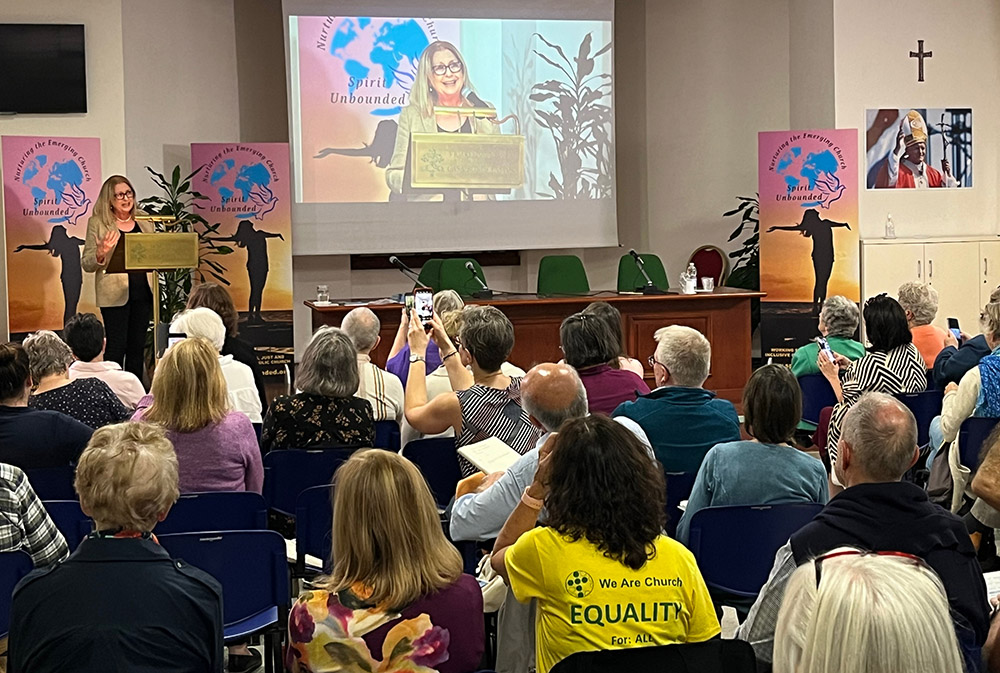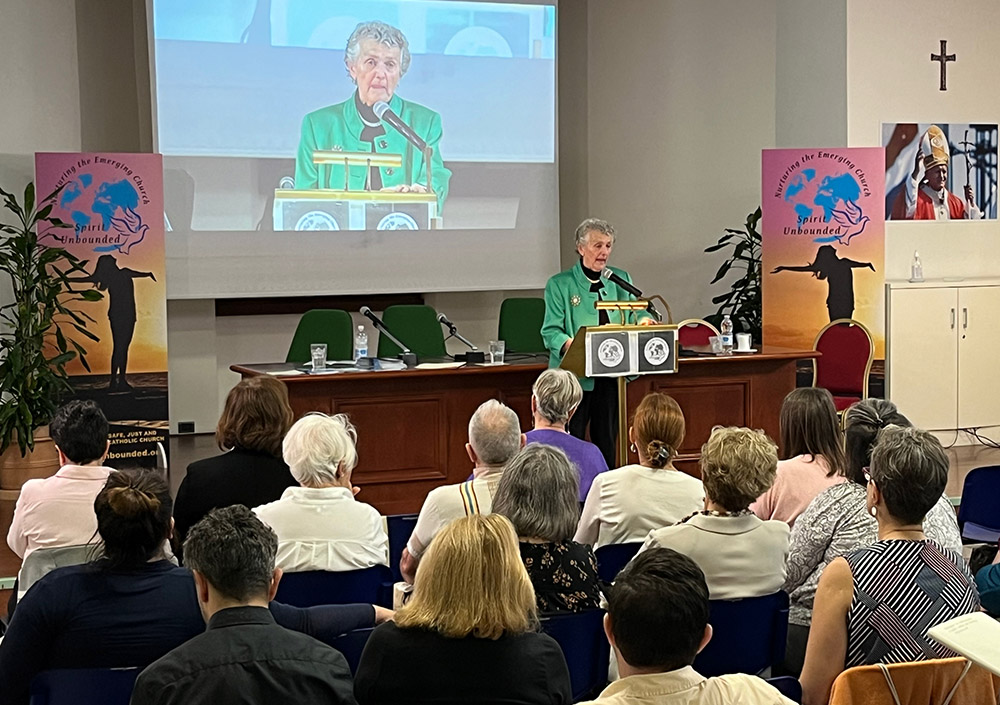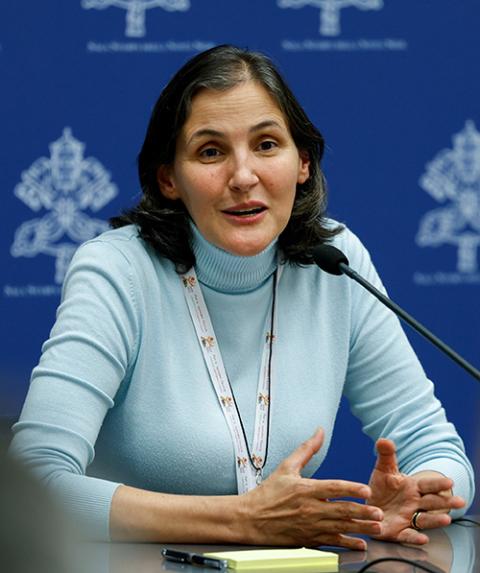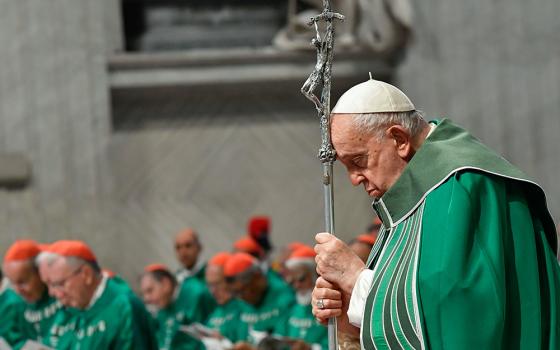
Former Irish President Mary McAleese speaks at the Spirit Unbounded event at Rome's Casa Bonus Pastor on Oct. 13. (NCR photo/Joshua J. McElwee)
Even as Catholic women take a historic step as voting members of the Synod of Bishops for the first time, former Irish President Mary McAleese slammed the Vatican Oct. 13 in a parallel gathering in Rome calling for equality for women as well as LGBTQ and other Catholics who feel excluded in the church.
McAleese spoke at "Spirit Unbounded," a conference held at Rome's Casa Bonus Pastor, and said that while she wished the synod well, the church's "embedded" inequality "scandalizes Christ." And the synod's "modest lay and female participation, is still modeled on a discipleship of unequals," she said, since bishops still control the majority of votes.
The synod is taking place at the Vatican Oct. 4-29. Of the assembly's 465 participants, about 80 are women and, for the first time, 54 of those women are among the about 365 full members of the assembly, who will be able to vote on its expected final document.
Spirit Unbounded featured in-person meetings in Rome and in Bristol, England, and virtual participation from across the world Oct. 8-14.
McAleese was part of a chorus of voices at the Rome events that included Benedictine Sr. Joan Chittister, a noted spiritual writer, who were eager to be heard, even if outside the synod hall.

Benedict Sr. Joan Chittister speaks at the Spirit Unbounded event at Rome's Casa Bonus Pastor on Oct. 13. (NCR photo/Joshua J. McElwee)
Chittister, who is also an NCR columnist, said more needs to be done to include those who are left out and hurt by the church.
"What do we do when a church toys with the equality of women but builds itself on structures that assure their inequality?" Chittister asked in a presentation ahead of McAleese's talk, hours after the synod assembly had heard reflections that morning on women's experiences in the church. "What, in fact, does the rejection of women at the highest levels of the church mean for men who claim to be enlightened but continue to support the very system that mocks half the human race?"
McAleese's and Chittister's comments came on a day when Luxembourg Cardinal Jean-Claude Hollerich asked synod members in the Vatican's Paul VI Hall to consider, "How can we make sure women are an integral part of the church? Do we feel threatened? Are we ready to accept that all parts of the body [of the church] are important?"
McAleese called the church an institution "languishing in a deepening credibility crisis" because of its failure to reform outdated governance structures, teachings and laws.
Chittister said that a religion that preaches the equality of women "but does absolutely nothing to demonstrate it within its own structures proclaims a theology of equality that is biblical but constructs for the church an ecclesiology of superiority."

Company of Mary Sr. Liliana Franco Echeverri speaks during a briefing about the assembly of the Synod of Bishops at the Vatican Oct. 10. (CNS/Lola Gomez)
Some of the Spirit Unbounded comments weren't far from what also was being discussed at the synod earlier in the day, including by participant Sr. Liliana Franco, president of the Confederation of Latin American and Caribbean Religious (CLAR).
"The journey of women in the church is full of scars, of junctures that have supposed pain and redemption," Franco said. "What's evident and definitive has been the love of God, a love that remains beyond the efforts, by some, to hide the presence and contribution of women in the construction of the church."
Franco, a sister of the Company of Mary, recounted stories of exclusion of women in church structures, in a parish, in a pontifical university and from parish and diocesan councils. In the end, what women in the church are seeking is not power or to relieve a feeling of inferiority, she said, but they long to live in fidelity to God's mission in whatever form that call comes.
She echoed Chittister's call for community, in which equality is at the heart.
But for that to happen, Chittister said, those in power have to renounce "chauvinism and sexism, clericalism and authoritarianism, justified in the name of Christ." She added that they "are not Christian virtues, whatever the system — church or state — that looks to them for legitimacy."
McAleese said that despite this synod's concessions of including more than bishops in church governance, the Vatican is not doing enough to include the full spectrum of Catholics, including many who don't feel welcome by the church they belong to.
Advertisement
"Ironically, the inclusion of a small cohort of women, much trumpeted, merely highlights the extent of the continuing gender imbalance at the core of church governance," she said. "It also highlights the resistance to equality in all its fullness. Equality is a right. It's not a favor. The women attending the synod on synodality are there as a favor, not as a right."
And it doesn't make up for the "ongoing failure to include women especially to the diaconate and priesthood," which only serves to limit church members' access to the sacraments and to vibrant parish life, she said, given the shortage of priests.
McAleese also protested the secrecy of what's being discussed at the synod, where the pope has asked members to maintain confidentiality about the discussions.
"Veiled discussions behind closed doors which are subject to confidentiality and publishing restrictions are disappointingly old-school and they smack of reluctance to trust even the Holy Spirit," she said.
Yet, she held hope that the synod will offer "an opportunity to recalibrate the shape of internal laws, structures and relationships, to drive towards a Christ-centered discipleship of equals."
"But only if the magisterium listens humbly and recognizes that there is a new leaven at work among the people of God," she added. "It is now apparent that the people of God are no longer bending the knee to the magisterium."







